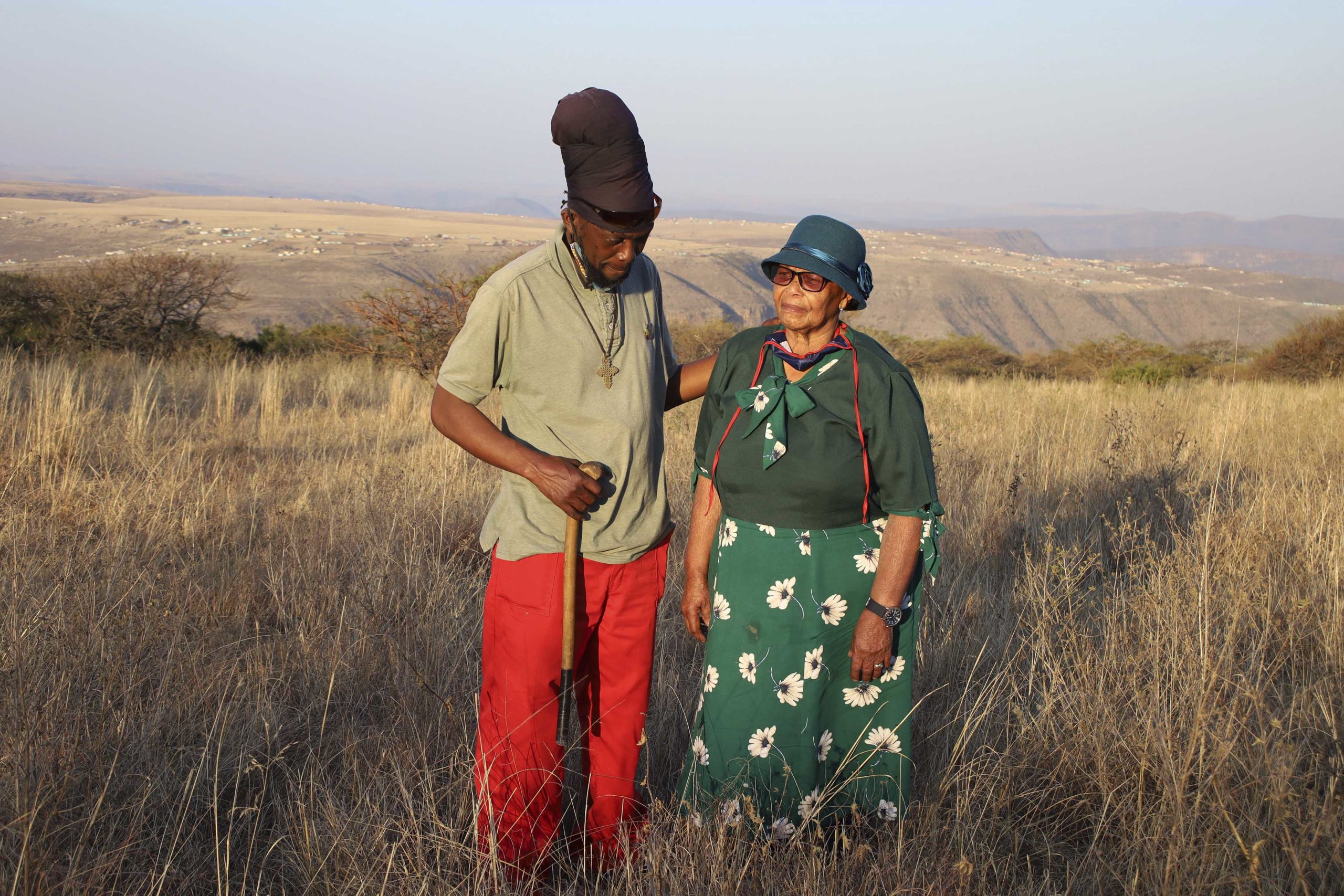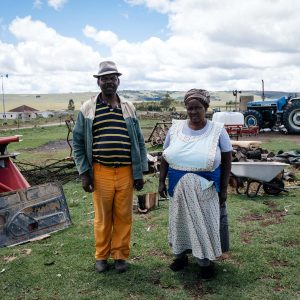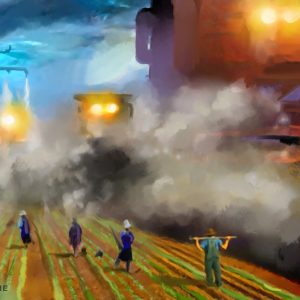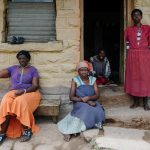Two decades on and still no joy for land claimant
In the first of a two-part series on land restitution and reform in Stutterheim in the Eastern Cape, an elderly woman tells of her battle against the government to get her land back.
Author:
13 October 2021

For 23 years, the Eastern Cape Department of Rural Development and Agrarian Reform has fobbed off Nomabhaso Skenjana’s land claim for a farm taken during apartheid. The department now wants to give it to a large group of her relatives, some of whom are so distant she has never heard of them.
Nomabhaso, 84, is the rightful heir to Mocking Hill, a 707-hectare farm on the banks of the Great Kei River. She has given the department several documents to prove this. But, for more than two decades, it has refused to recognise her as the rightful claimant. She even grew up on the farm in Stutterheim, Eastern Cape, which white men grabbed at gunpoint in the late 1940s. She lodged a land restitution claim in 1998 with the written support of her older sibling, Mlamli Skenjana, and cousin Ntombizodwa Veronica Skenjana. Both have since died of old age without seeing their ancestral land returned.
For the past 23 years, the department has stalled, allegedly trying to get the family to agree to compensation. But Nomabhaso has steadfastly refused to accept money in lieu of Mocking Hill. A neighbouring commercial farmer told Nomabhaso a few years ago that she would never get her land back because he had heard it was going to be handed over to someone politically connected.
Going back centuries
Situated near to Mgwali village where the Skenjana family homestead is located, the farm belonged to Skenjana’s great-great-grandparents. They were one of 10 Black families in the area who bought the land in the 1870s. White settlers had earlier stolen it from amaXhosa, but later abandoned the land after it proved difficult to farm. By 1950, this group of successful Black commercial farmers had been steadily forced off the land.
“My father died fighting in World War II. Before he went to war, he instructed that I should be sent to live on the farm. So I stayed on Mocking Hill farm until I was five years old and then went back to our homestead in Mgwali village,” says Nomabhaso.
She struggles to hold back the tears as she recalls how her family later received word that armed white men had stormed Mocking Hill farm one night. The aunt she had lived with on the farm, MaKhambule, was alone at the time and fled down a steep cliff into the Great Kei River with nothing but the clothes on her back, escaping through the water into what later became the Transkei.

Now, because the department has dallied so long, Mocking Hill has been abandoned for years. The Skenjana ancestral graves have been destroyed. The department has barred Mduduzi, 47, Nomabhaso’s son and a keen vegetable farmer, from setting foot on the farm while the claim remains unresolved. What could be productive land is overgrown with acacia trees and thorny bushes, which have grown across the road leading to the farmhouse, now in ruins. The only signs of life at Mocking Hill are hundreds of the neighbouring farmer’s cattle that roam freely without permission or restraint.
Nomabhaso cannot easily visit the farm. The white commercial farmer who owns the neighbouring cattle farm locks a gate across the only dirt road leading there. To gain access, the Skenjanas must first visit the Bolo police station and request a police escort to the commercial farmer’s other farm, Good Hope, some 25km away, where they must negotiate with the farmer to ask his employees to unlock the gate.
Such an attempt to visit the farm takes the whole day. It is a bittersweet moment for Nomabhaso when she finally steps on to her land as evening falls. She battles her way through the thorn bushes to the edge of the cliff on the Great Kei River with her arm around Mduduzi and tells the story of how her land claim went wrong.

Falsely laid claims
A man known as Ncedo Ngqeba, whom Nomabhaso claims changed his name to Ncedo Skenjana, allegedly to lay claim to the land, visited Nomabhaso one day, saying he was the son of her brother Banzi. He said he was sorry for her troubles with the department and offered to act on her behalf. “Because I was so old, I readily agreed,” she says. Later she found out the man’s mother had grown up in the same village as Nomabhaso but was not a relative – and nor was he.
Ncedo “knew everything about the farm from his mother”, says Mduduzi. “He then came to Nomabhaso pretending to be helpful. We only heard later that he had already been to Mlamli [Nomabhaso’s late brother] and asked him for permission to claim Mocking Hill, but Mlamli refused and threw him out of his house. And then my uncle Banzi’s daughter told us that her father had warned her that this man was not his son. He’s no relation to us at all.”
The family wrote to the department withdrawing Ncedo as their representative, but it ignored them for years. Mduduzi has asked Ncedo several times to take a DNA test to show he is related to the Skenjana family, but he has refused. Ncedo did not respond to questions asking him how he was related to Nomabhaso.
Related article:
According to the department’s guidelines, nobody can make a land claim unless they are the person dispossessed of the land, the executor of the rightful owner’s estate, a direct descendant, or a trust or community representative where a community was dispossessed. To prove that they are the descendants of the rightful or original owners of the land, claimants must supply proof from “archives, deeds registrations [and/or] information relating to dispossessions (by whom and how they were carried out)”.
Nomabhaso is the last remaining direct descendant of the owner of the farm. She is the daughter of Tutu Skenjana, the son of Klaas and Sarah Skenjana, who owned the farm. She has provided the department with evidence of this.
“We don’t know how anyone can go to the government and just sign as a land claimant when they are not even from the family. It can only be corruption. Ncedo has even said to us, ‘I am working with the government people and you can try whatever you want to try,’” says Mduduzi.
Enlisting help
The family engaged social activist and former Robben Island political prisoner Sipho Singiswa to advocate for them in 2009. Singiswa lodged a corruption complaint with the former minister of the Department of Agriculture, Rural Development and Land Reform, Gugile Nkwinti. In June 2021, Singiswa lodged another complaint of fraud against Ngqeba and of corruption against five officials of the provincial department with the current land reform minister, Thoko Didiza. In her response, Didiza said she had referred the complaint to her legal department to be investigated.
Singiswa says Ncedo allegedly tried to negotiate with department officials that instead of getting the land, he would receive “compensation” of R1.5 million. At one point, officials told Nomabhaso and Mduduzi that their claim would be invalidated if they did not retain Ncedo as the claimant, says Singiswa.
Related article:
In a letter to Singiswa, deputy chief land claims commissioner Cindy Benyane denied that any corruption had taken place, saying the claim had been “taken through a rigorous validation and vetting process”. Benyane said the land would be given back to the Skenjana family, but the “challenge” was “family disputes and mistrust among the family members” and for all “eligible beneficiaries” to be included.
The department convened a meeting on 6 September with a large number of people with the surname Skenjana. A group of people mainly from Gqeberha were told they would all be beneficiaries of the farm, says Mduduzi, who, along with his mother, boycotted it. No one from the Skenjana family from Mgwali village was there. “The surname of those who attended is Skenjana but we don’t know them all. My mother doesn’t know them,” Mduduzi says. At this meeting, Nomabhaso’s nephew, Odwa Swenjana, was elected as the new representative for the land claim, though he had never been involved.
Little hope of productivity
Today, Ncedo is still listed as one of the beneficiaries of the land, along with his spouse, even though neither is related to Nomabhaso. “The department just wants me to die, like my brother and my cousin. They are so corrupt and they are waiting for me to die at any moment so that they can do whatever they want with my land,” Nomabhaso says.
Singiswa says: “The department is complicit in attempting to assist Ncedo to conspire to overwhelm Nomabhaso … with bogus family members and numbers to outvote her … like a rent-a-crowd scheme to undermine her wishes and claim to the land.”
He adds that the department has convened several meetings over the years in what he believes is an attempt to convince the group to give up the land claim and accept compensation. In one, Ncedo invited a number of people unknown to Nomabhaso. The only thing they had in common was a shared last name. “At this meeting Nomabhaso and Mduduzi laid bare their suffering and abuse from Ncedo … but the majority of the attendees invited by Ncedo were simply not interested in her plight [and said] ‘let bygones be bygones’,” Singiswa says.
Related article:
Singiswa, Nomabhaso and Mduduzi all say they fear the department will eventually persuade the large group of “claimants” to accept compensation instead of the land. The department denies this.
New Frame asked the department what proof Ncedo had that he was the rightful claimant and why, after 23 years, it suddenly insisted on including people with the Skenjana surname in the land claim, even if they were only distant relatives. Trevor Hattingh, spokesperson for the Commission on Restitution of Land Rights, said he was unable to get this information from Zama Memela at the office of the regional land claims commissioner. Memela refused to respond to any questions. Didiza also did not respond to questions.
Mduduzi says there is little chance of the farm becoming a productive enterprise if it is given to a huge group of people they do not even know. He and Nomabhaso are now planning court action against the department.




